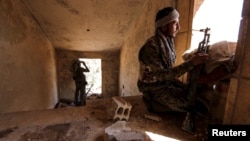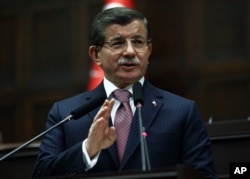Turkey shelled Kurdish forces advancing in northern Syrian for a fourth day Tuesday, despite calls from Western allies to stop. Damascus has also condemned Turkey's military actions in Aleppo, calling the shelling a violation of Syria's sovereignty and asking the U.N. Security Council to step in.
Ankara, however, appears determined to continue targeting Kurdish YPG militia.
Russia is set to raise the issue Tuesday with the U.N. — a move dismissed by Turkish Prime Minister Ahmet Davutoglu.
"What an attitude!" he said, adding that Russia is bombing hospitals and schools, and then turning around and referring Turkey to the Security Council to address border security.
The Turkish prime minister also repeated his threat against the Syrian Kurds.
"We will do what is necessary if they continue to advance," he warned.
The YPG militia is moving ahead with its westward advance to link up with a Syrian Kurdish canton.
A senior Turkish official, speaking on condition of anonymity, said the shelling is in retaliation for attacks by the Syrian Kurdish group. However, the official could not give any photographic evidence of the attacks, or say when and where they occurred.
Ankara accuses the YPG of being an extension of the PKK rebel group that is operating inside Turkey. Kadri Gursel, a political columnist for the Al-Monitor website, said Ankara is becoming isolated from its allies over their support of the YPG and its political wing, the PYD.
"The West, in general, sees the PYD as a reliable ally in the fight on ISIS,” Gursel said, using an acronym for Islamic State. “Ankara seeing the PYD as more of a threat than ISIS is a very, very problematic outlook; this is a totally upside-down approach."
‘Them or us’
Ankara's relations with Washington, which has conducted airstrikes in support of the YPG, are becoming particularly strained. Turkish officials say U.S. weapons given to the Syrian Kurds have ended up in PKK hands. Washington denies arming the YPG.
Late last month, the U.S. State Department official coordinating the global effort against Islamic State, Brett McGurk, traveled to the Syrian town of Kobani, where he met with PYD and YPG members. Following that meeting, Turkish President Recep Tayyip Erdogan said Washington must choose between Turkey and the PYD as its partner.
Still, the dispute over the Syrian Kurds is unlikely to lead to a complete rupture between the U.S. and Turkey, said international relations expert Soli Ozel.
"The Turkish challenge — it's either them or us — and the American response — it's both of you and we will continue with the PYD — under normal circumstances would create a severe diplomatic crisis,” Ozel said. “But Turkey does need the United States, and [on] the issue of the PYD, it's quite evident the U.S. will not change its ways and Turkey will not change its ways."
Pro-government media in Turkey are calling for U.S. forces to be barred from using Turkish air bases for its airstrikes against Islamic State. So far, however, Ankara has resisted calls for any sanctions against Washington.





